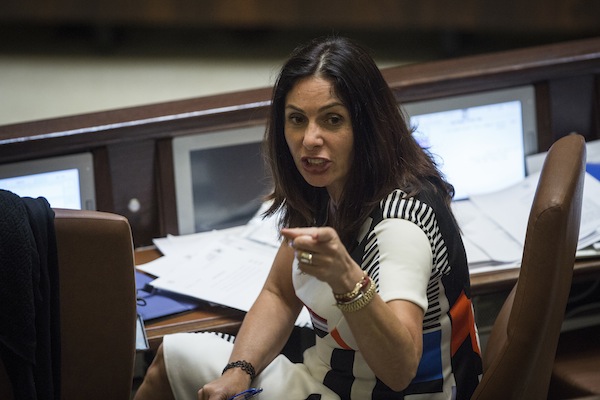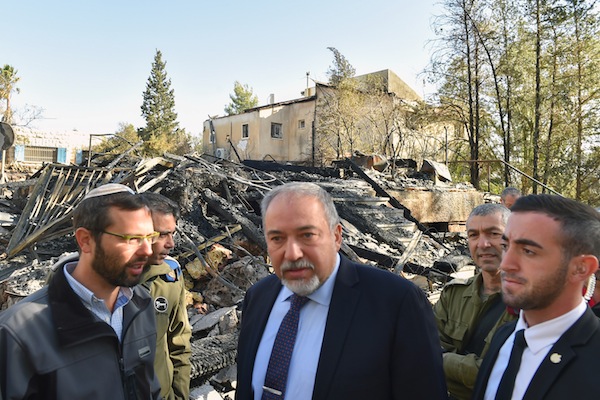Miri Regev says current wildfires tearing through are simply a continuation of the massacres committed against Jews in the 20th century.

Miri Regev is the latest leader to join the chorus of Israeli government ministers inciting against the country’s Palestinian citizens over the past week, fueling allegations that Palestinians have been behind the hundreds of wildfires tearing through the country.
Never one to be outdone by her friends on the right, Minister of Culture and Sport Regev published a Facebook status on Sunday morning comparing the fires, which continue to rage across both Israel and the West Bank, to massacres and pogroms against Jews in the 20th century. Labeling the fires “Praot Tash’az” (the Hebrew equivalent of saying “The 2016 Riots,” the word “tash’az” denotes 5777, the current Hebrew year), Regev admonished the “political correctness” of those who believe waiting for the full results of police investigations is, well, the right thing to do. My translation:
The Israeli government will convene in Haifa City Hall in the next few hours to discuss the arsons of the past few days. Political correctness is trying to force us to bury our heads in the sand, while everything around us burns.
The first step is to call the child by its name — this bad child’s name is “Praot Tash’az” and it is an incarnation of the arsons in Fez, Kishinev, Hebron, Hartuv, and Be’er Tuvia.
This time, praise be to God, the Jewish people have a state and a government, and they are not planning on burying their heads in the sand. I will make sure that decisions are made that will lead to stopping the enemy within and beyond.
As Local Call’s Yael Marom noted earlier this week, Israeli politicians and leading media outlets alike jumped at the opportunity to pin the fires on Arabs. Netanyahu made sure to frame the alleged arson as terrorism, and the accused arsonists as terrorists. “Every fire caused by arson, or by incitement to arson, is terrorism,” Netanyahu said. “Anyone who tries to burn parts of the State of Israel will be punished severely.”
Education Minister Naftali Bennett continued the trend, stating: “Only he who the country doesn’t belong to him is capable of burning it.” Several days later, standing with the residents of the West Bank settlement Halamish — where 15 homes were burned down, allegedly as a result of arson — Bennett called the arsonists “fire terrorists” whose goal is to “murder Jews.”
On Sunday morning Public Security Minister Gilad Erdan said that Israeli security forces, whom are subordinate to him, should demolish homes belonging to arsonists. Meanwhile Defense Minister Avigdor Liberman said that at least 17 of the 110 wildfires were the result of arson, suggesting that “the best response is to expand settlements.” The defense minister is responsible for approving settlement construction.
At present Israel police have arrested a total of 37 people suspected of arson, 18 of whom are Palestinian citizens. Two Palestinians, from the northern village of Deir Hanna and the city of Umm al-Fahm, respectively, have confessed to starting fires. The police have also arrested a total of eight people, five Arabs and three Jews, of suspected incitement.
The story of the arsons has become a bit murky, since Israeli police are providing information on the arrestees piecemeal at best. According to a report in Haaretz, some of the Arab suspects under arrest are alleged to have committed arson in their own towns and cities, i.e. not targeting Jews, and none of them took part in any attacks that led to major fires, such as those in Haifa, Nataf, or Zichron Ya’akov.

The Haaretz report added that among those in custody are a resident of Nazareth suspected of setting fire to a neighborhood in his home city, and two others who allegedly set fire to trees between Sajur and Beit Jan, both of which are Druze villages in the Galilee.
Meanwhile police also arrested Anas Abudaabes, a journalist from the Bedouin township of Rahat after he wrote a satirical Facebook post criticizing fellow Arabs who have taken to social media to call for arson attacks against Israel. Despite public criticism of the arrest and even acknowledging that the post in question was satirical, a judge kept him in jail over the weekend. Abudaabes was released on Saturday evening, although he could still face charges.
As my colleague Haggai Matar has pointed out, hundreds of wildfires have erupted across the Middle East over the past week due to strong winds and dry weather. The Palestinian Authority has counted over 200 fires in the West Bank alone. The fact that the fires have hit Israel especially hard, and even if some of them are indeed arson, does not grant ministers carte blanche to incite against 20 percent of the population — and certainly not to abuse Jewish history in the process.

